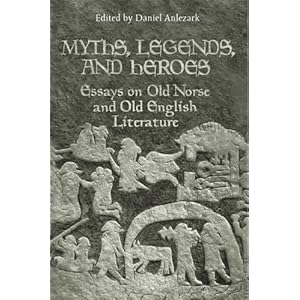
Yeah, I'm lazy. It's taken me three weeks to get around to updating the March batch of folklore arrivals in your bookstores. If I were to find a bookstore well-stocked enough to have all of these titles, I just might have to move in!
- Myths, Legends & Heroes: Essays on Old Norse and Old English Literature - Daniel Anlezark, ed. Part of TONIS: Toronto Old Norse-Icelandic Series. This is a festschrift for the professor John McKinnell of Durham.
- The First Fossil Hunters: Dinosaurs, Mammoths, and Myths in Greek and Roman Times - Adrienne Mayor. A study of mythological stories as recognition that monsters once did roam the earth.
- The Columbia Anthology of Chinese Folk and Popular Literature - Victor H. Mair & Mark Bender, eds.
- Blood Will Tell: Vampires as Political Metaphors Before World War I - Sara Libby Robinson. From the series Out of the Series.
- The Myths of the Gods: Structures in Irish Mythology - Alan Ward.
- The Mute Immortals Speak: Pre-Islamic Poetry and the Poetics of Ritual Myth - Suzanne Pinckney Stetkevych. Cornell University Press's series "Myth and Poetics." A study of the Bedouin poetic cycle the 'qasidah,' which has long served as a profane parallel to the Qur'an.
- The Ravenous Hyenas and the Wounded Sun: Myth and Ritual in Ancient India - Stephanie Jamison. Paperback edition, which is also from the Cornell series "Myth and Poetics."
- Monsters of the Gevaudan: The Making of a Beast - Jay M. Smith. In the 1760s in rural France, a legendary beast terrorized the local population, this is the story of the legend and the facts.
- Tracking the Chupacabra: The Vampire Beast in Fact, Fiction and Folklore - Benjamin Radford. A study of a more recent monster.
- Myths and Legends of Ancient Greece and Rome - E. M. Berens.
- The Essential Asian Folklore Collection - Various. Well, it does say 'essential,' so it better be on your shelf soon! :)
- Folklore and Legends of Rochester: The Mystery of Hoodoo Corner and Other Tales - Michael Keene.
- Gentlemen and Amazons: The Myth of Matriarchal Prehistory, 1861-1900 - Cynthia Eller.
- The Oldest Irish Tradition: A Window on the Iron Age - Kenneth Hurlstone Jackson. Reprint of the 1964 Rede Lecture.
- Dostoevsky and the Russian People - Linda Ivanits. I saw Prof. Ivanits give a guest lecture on Dostoevsky and Turgenev in grad school, and I found myself disagreeing wholeheartedly with the premise of her lecture. However, she did write one of the greatest books on Russian folklore, so this book is still a must-buy! (I think the Rusalka on the cover of "Russian Folk Belief" would make a kick-ass tattoo!)
- You Did What in the Ditch?: Folklore of the American Quilter - John L. Oldani.




